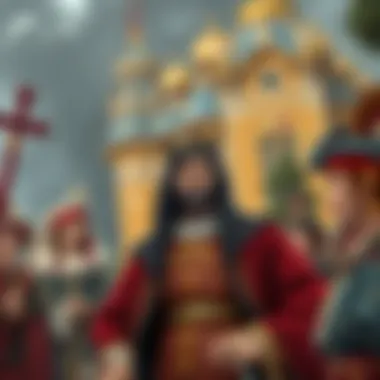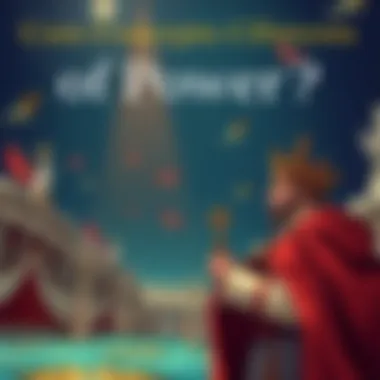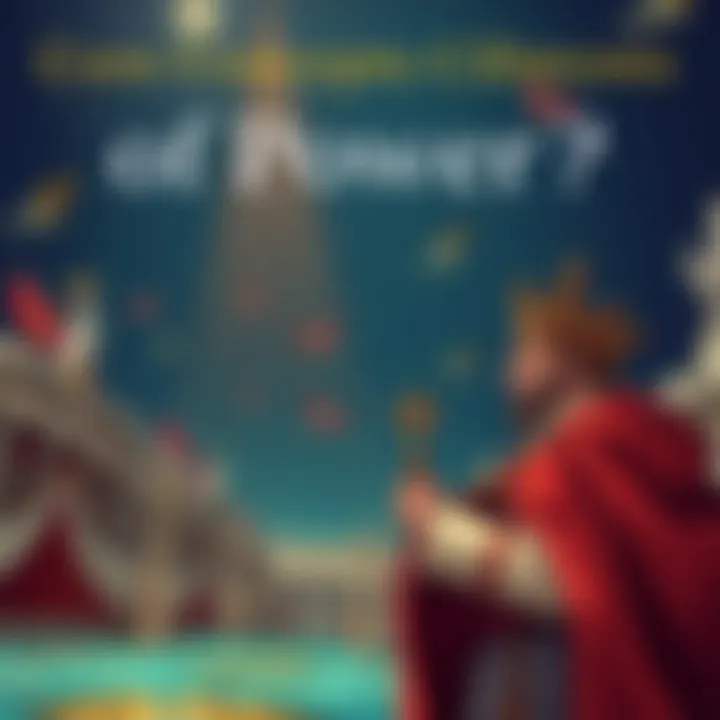Analyzing Machiavelli's The Prince: Insights and Implications


Intro
Niccolò Machiavelli's The Prince remains a cornerstone of political philosophy and serves as a beacon of discourse on power dynamics throughout history. Written in 1513, this treatise provides a frank and sometimes unsettling look at the mechanisms of power, governance, and the nature of humanity itself. Machiavelli was not merely a political theorist; he was a keen observer of the intricacies of statecraft during a tumultuous period in Italian history.
In this article, we will sift through the layers of Machiavelli's wisdom, examining the historical context that shaped his thoughts, exploring the core themes embedded within his writing, and assessing the ethical implications that arise from his perspectives. The political landscape has continued to evolve since Machiavelli's time, yet the truths he articulated still resonate in contemporary discussions and debates.
Far from being a relic of the past, The Prince encourages a reflection on the essence of power and challenges us to consider the responsibilities that come with it. Through this exploration, readers are invited to not only engage with Machiavelli’s assertions but also to question their applicability to today’s political climate. By the end of this article, you should possess a deeper understanding of Machiavelli’s enduring influence, with insights that can be applied to real-world situations—both past and present.
Let’s kick off this journey by identifying the categories of life-changing books, beginning with Machiavelli's significant contribution to the genre of political literature.
Historical Context
Understanding the historical context surrounding Niccolò Machiavelli and his seminal work, The Prince, is crucial for grasping the intricacies of its themes and the motivations behind its creation. The turbulent political landscape of Renaissance Italy set the stage for Machiavelli's writings, informing his views on power, governance, and the pragmatic demands of leadership. This examination reveals not only the milieu in which Machiavelli operated but also the pressing issues that influenced his perspective on human nature and political maneuvering.
Machiavelli's Life
Machiavelli was born in 1469 in Florence, a city that would become a cornerstone of Renaissance culture and politics. He was a man of many roles, serving as a diplomat, philosopher, and historian, which provided him firsthand insight into the corridors of power. This experience was pivotal; he witnessed the struggles between the powerful ruling families, such as the Medici, and the ongoing factional conflicts that characterized Florence and its neighbors.
Being a public servant during a time of turmoil and instability played a significant role in shaping his ideas. After the fall of the Republic in 1512, Machiavelli found himself out of favor. This political ostracism, combined with his commitment to understanding effective governance, fueled his desire to write The Prince as both a personal catharsis and a guide for future rulers. By examining Machiavelli's life, readers can trace how his experiences seeded the practicalities and harsh realities of his theories.
The Political Landscape of Renaissance Italy
Renaissance Italy was marked by fragmentation and strife, lacking the unified states that characterize modern nations. Instead, it was a patchwork of city-states often at war with each other. The constant shifting of alliances, betrayals, and power struggles amongst nobles translated into an environment rife with both opportunity and danger for aspiring leaders. The Italian Wars and the influence of foreign powers such as France and Spain further complicated this landscape.
In this setting, Machiavelli observed the potency of military might and the necessity of adaptability in leadership. His reflections emerged not just from Florentine politics, but from the larger Italian experience. The fluidity of allegiances and the precariousness of power meant that rulers had to be astute and sometimes ruthless to survive.
"It is better to be feared than loved, if you cannot be both."
This famous axiom illustrates his belief in the need for pragmatic governance in the face of the era's challenges. By addressing the fundamental nature of power and its often morally ambiguous methods of acquisition, Machiavelli painted a vivid picture of political life during a transformative epoch.
In summary, exploring the historical context of The Prince provides critical insights, illustrating how Machiavelli's experiences were intertwined with the socio-political dynamics of his time. His life story and the chaotic environment of Renaissance Italy shape the backdrop for understanding the enduring relevance of his ideas on power and statecraft. Understanding these elements is key for any deep dive into Machiavelli's guiding principles in governance.
Overview of The Prince
Machiavelli's The Prince stands as a pivotal text in the realm of political philosophy. It offers insights that resonate well beyond the Renaissance context in which it was written. Understanding the essence of this work is crucial for anyone interested in the mechanics of power and governance. By delving into the various aspects of The Prince, readers can not only grasp Machiavelli's intentions and principles but also appreciate its lasting relevance in modern politics.
Structure and Organization
Machiavelli's work is neatly organized, flowing from a general discussion of principalities to specific advice for rulers. The structure of The Prince is deliberate and designed to guide the reader through a maze of political realities. It starts with an overview of different types of principalities—such as hereditary and new—before addressing the strategies one might employ to acquire and maintain power.
Machiavelli outlines these concepts systematically, often illustrating his points with historical examples. Each chapter builds on the previous ones, creating a coherent narrative. Here’s a simplified look at the organizational breakdown:
- Introduction to Principalities
- Acquisition of Power
- Maintenance of Power
- Military Strategy
This carefully crafted architecture not only aids in understanding the practical applications of Machiavelli’s ideas but also emphasizes the interconnectedness of various themes throughout the text.
Notable Chapters and Concepts
Several chapters in The Prince have bid a particular resonance with readers and scholars alike. Among these, chapters focusing on the roles of virtue and vice in leadership stand out. Machiavelli controversially suggests that a ruler may need to embrace deceit and manipulation when necessary. This unapologetic approach raises questions about morality and ethics in political leadership.
Key concepts include:
- Virtù: This refers to a leader's ability to shape his fate and respond to changing circumstances. Unlike fortune, which is unpredictable, virtù represents a mix of skill, bravery, and wisdom.
- Fortuna: Used to describe chance or luck, fortuna is something that leaders must navigate wisely. Machiavelli asserts that while fortune can favor one, it is the adept ruler who can capitalize on these moments to secure their reign.
- The Ends Justifying the Means: A recurring theme is that achieving and maintaining power may require morally dubious actions. Machiavelli suggests that effective governance often requires prioritizing outcomes over ethics.


These concepts not only illustrate Machiavelli’s pragmatic approach to governance but also serve as critical points of discussion in modern political discourse. By focusing on efficacy over idealism, Machiavelli challenges readers to reconsider the delicate balance between ethics and power dynamics.
Central Themes
The central themes of Machiavelli's work are not only the backbone of The Prince but also crucial to understanding the evolution of political thought. These themes highlight the complex interplay between morality, power, and human nature, laying the groundwork for much of modern political philosophy. In this section, we will unpack three predominant themes: Realism vs. Idealism, The Role of Fortune, and Virtù and Its Implications. Each of these aspects reveals unique insights into Machiavelli's understanding of governance and human behavior.
Realism vs. Idealism
In The Prince, the tug-of-war between realism and idealism is glaring. Realism is often perceived as a cold gaze at the unruly side of human nature, whereas idealism allows for a more hopeful perspective where leaders strive for virtue and the greater good. Machiavelli proposes that effective rulers must navigate these waters skillfully. They not only need to understand public opinions and aspirations but must also be prepared to act harshly when circumstances demand.
Machiavelli chastises leaders who cling to lofty ideals when dealing with a pragmatic world. Consider the famous quote, "It is better to be feared than loved, if you cannot be both." This perfectly encapsulates Machiavelli's stance: idealistic notions of leadership often create vulnerabilities. By embracing a more realistic approach, one that acknowledges the harshness of human nature, leaders can maintain stability and control. This don’t mean they should forsake ethicality entirely but rather adapt their strategies according to the situation.
The Role of Fortune
Fortune, in Machiavelli’s eyes, plays a substantial hand in the rise and fall of powers. He likens it to a raging river that can flood and reshape the landscape, regardless of how strong an individual's foundation might be. It represents that capricious element in life that can thrust a leader into glory or ruin without notice.
He elaborates on the importance of recognizing and mastering fortune as much as one can. While some might argue that fortune is purely random, Machiavelli suggests there are ways to anticipate her whims. The adept ruler should prepare to seize opportunities when they arise, thus harnessing fortune rather than allowing it to dictate his fate. One could say, pulling from colloquial wisdom, that "you make your own luck" isn’t far from Machiavelli’s worldview.
This theme is particularly relevant today as politicians and leaders continue to navigate unpredictable landscapes filled with societal upheaval and economic shifts. The ability to adapt to unforeseen circumstances—much like navigating through a stormy sea—is crucial for contemporary leaders.
Virtù and Its Implications
Virtù is a critical concept in Machiavellian philosophy, often misunderstood as merely virtue in the conventional sense. Rather, it's about the qualities and skills that an effective leader should have, encompassing courage, decisiveness, and intelligence. This is not to be confused with moral virtue as understood in a religious or ethical context, but more of a pragmatic toolkit for survival and effectiveness in governance.
The implications of virtù are far-reaching. For a ruler, possessing virtù means being able to act decisively and ethically, to read the landscape of politics, and to adapt strategies in real-time to hold power. Machiavelli argues that a great leader does not shy away from the grim realities of life but embraces them. They embody a mixture of audacity and cunning, where proper use of these traits can prove indispensable.
This idea resonates intensely with contemporary politics, where leaders often find themselves in bind situations requiring them to employ a range of strategies—sometimes unconventional, sometimes difficult—to maintain power and achieve their aims.
In sum, Machiavelli's exploration of these central themes seeks to illuminate the challenging nature of leadership. By dissecting the balance of realism and idealism, understanding the whimsical role of fortune, and cultivating virtù, political leaders today can glean valuable lessons from The Prince's pragmatic guidance on navigating complexity in governance.
Machiavelli’s View on Power
Machiavelli's exploration of power is crucial in understanding his political philosophy, particularly as it relates to leadership and governance. He presents a pragmatic view of political authority that diverges sharply from idealistic perspectives on governance. Central to his examination is the belief that power should be acquired and maintained through astute, sometimes ruthless, strategies. His analysis transcends mere theoretical musings; it has real-world applications that resonate even in contemporary political debates.
Acquisition and Maintenance
In The Prince, Machiavelli argues that the acquisition of power is often a result of shrewd calculations and timely actions. Whether through cunning negotiations, militaristic ventures, or popular support, the initial path to power is paved with tactical moves and a readiness to adapt to changing circumstances. He asserts that new princes, in particular, face distinct challenges. Unlike hereditary rulers, they must establish their position firmly. The text mentions that fortune plays a role, but it is one’s virtues—skills, decisiveness, and ambition—that ultimately decide success.
For instance, take the case of Cesare Borgia, a significant figure in The Prince. Machiavelli cites Borgia’s ability to consolidate power using both force and calculated alliances, showcasing his adeptness in the art of leadership. What’s essential here is that maintaining power often requires being flexible enough to shift tactics without losing sight of the long-term vision. It’s not just about getting to the top; it’s about staying there.
Key Strategies for Acquisition and Maintenance:
- Building Alliances: Establishing strategic relationships can provide crucial support.
- Understanding Public Opinion: Knowing what the populace desires can guide decisions and policies.
- Military Preparedness: A ruler must be ready to defend their territory or assert their authority swiftly.
The Use of Deception
Deception is another theme woven deeply into Machiavelli’s narrative on power. He posits that traditional moral values often do not apply when it comes to ruling, and at times, deceit is not only expected but necessary. The ability to present oneself favorably can determine a ruler's strength.
Machiavelli acknowledges the duplicity often inherent in politics. Using clever strategies to mask one's true intentions, or to create a veneer of virtue, leads to a stronger position in the eyes of rivals and the populace alike. He points to historical instances where leaders, through trickery and guile, managed to outsmart adversaries and secure their rule.
He famously advises that it is better for a ruler to be feared than loved, but if one cannot be both, fear is the more reliable path. This perspective invites a dichotomy in ethics, softening the harshness of political reality into a tool of survival. In practice, this plays out through shifting narratives, creating scapegoats, and employing misinformation when necessary.
The Impact of Fear and Love


Machiavelli’s reflections on fear and love illustrate the balancing act leaders must play. He believes that while love can inspire loyalty and admiration, fear serves as a more powerful deterrent against dissent. He states, "it is better to be feared than loved, if you cannot be both." This assertion underscores a chilling reality of leadership: maintaining control often involves an element of intimidation that secures a ruler’s position.
The interplay of fear and love can also be seen in how leaders manage their public image and respond to challenges. Leaders who evoke fear may link their authority with discipline and order, while those who foster love may risk becoming subjects of their followers’ whims. A ruler must recognize when to employ each sentiment strategically.
"The ends justify the means" is a phrase that epitomizes Machiavellian thought, urging leaders to prioritize effectiveness in the pursuit of power without being hindered by ethical constraints.
For further exploration of Machiavelli's influence on modern philosophy and politics, the following resources may provide additional context:
- Encyclopedia Britannica on Machiavelli
- Machiavelli's Ethics - Stanford Encyclopedia of Philosophy
- Historical Overview at Wikipedia
Ethical Considerations
The ethical dimensions of Machiavelli's The Prince invite a profound exploration that resonates through centuries of political discourse. Examining this topic is crucial, as it sheds light on the moral framework underlying political actions and the rationale behind leadership decisions. Machiavelli’s ideas challenge traditional notions of ethics in governance, facilitating a broader understanding of the realpolitik that often characterizes political life today.
Moral Implications
At the heart of ethical considerations in The Prince lies the complex relationship between morality and power. Machiavelli posits that the ends often justify the means. This perspective raises questions about accountability and the responsibilities leaders hold towards their subjects. Key moral implications include:
- Separation of Ethics from Politics: Machiavelli’s stance suggests that a ruler must sometimes act immorally to maintain stability and security, emphasizing the practical over the ideal.
- Power Dynamics: The text implies that effective leadership can necessitate choices that are not traditionally deemed ethical. This relativity of moral standards leads to a consequentialist approach where results take precedence over methods.
- Public versus Private Morality: Machiavelli delineates between personal virtues and what might be deemed necessary in the public sphere, arguing that leaders may need to shed their personal moral compass for the greater good of the state.
These elements provokes the reader to reflect on their own values and the often murky waters of ethical leadership. While Machiavelli’s pragmatic approach offers a strategic lens through which to evaluate governance, it also sends ripples of discomfort regarding the moral integrity of political power.
Critique of Machiavelli’s Ethics
The ethical underpinnings of Machiavelli’s thought have led to a spectrum of interpretations, from staunch criticism to acceptance of his bold realism. Critics highlight several aspects that warrant discussion:
- Cynicism in Approach: Detractors argue that advocating deceit and manipulation undermines the very essence of virtuous leadership. By separating ethics from public life, they contend that Machiavelli fosters a cynical view of humanity.
- Historical Context: Some scholars emphasize that Machiavelli's work must be understood against the chaotic backdrop of Renaissance Italy. His pragmatic strategies reflect a response to the violent political realities of his time.
- Misinterpretation: Some claim that readers misinterpret Machiavelli as endorsing immorality, when perhaps he intended a descriptive analysis of power rather than a prescriptive guide to governance. This nuanced view allows for recognition of power dynamics without forsaking ethics altogether.
Overall, the critique of Machiavelli's ethics invites a broader dialogue about the moral complexities inherent in political life. While his recommendations often provoke unease, they illuminate the harsh realities that leaders face, challenging us to reconsider our assumptions about power and virtue in governance.
Machiavelli’s Influence
Machiavelli's insights have created ripples across the centuries, shaping the way we view power, governance, and human nature. His influence extends beyond mere academic debate; it has seeped into the very fabric of modern political thought. Understanding this influence is essential for grasping the nuanced perspectives that arise from Machiavelli’s writings. His pragmatic approach to politics offers a stark contrast to the idealistic views that many philosophers expound. The allure of Machiavelli lies in his willingness to confront the harsh realities of political life, making his work relevant in both historical and contemporary contexts.
Political Philosophy
Machiavelli’s brand of political philosophy is rooted in realism. He shunned romantic notions about how leaders ought to behave, favoring instead a candid examination of how they often do. In The Prince, he argues that the ends justify the means. This phrase, often bandied about in discussions of ethics, boils down to the idea that if a ruler’s actions foster stability and power, they are justified, no matter how unscrupulous.
He posited that a wise leader must be both a lion and a fox—strong yet cunning. This duality is pivotal; it encourages a tactical mindset that perceives the complexities of political dynamics. Leaders who ignore these principles, he warns, often find themselves at the mercy of unpredictable fortunes and political adversaries.
Machiavelli’s thoughts have thus laid the groundwork for many modern discussions about governance. His concepts resonate in areas like political pragmatism, strategy, and the relationship between power and morality. Here are several key aspects that showcase his influence:
- Realpolitik: A practical approach to politics that prioritizes practicality over ideology, shaping international relations.
- Political Stability: Machiavelli’s works continue to inform the discourse surrounding governance and power-sharing in volatile regions.
- Human Nature: He famously asserted that humans are inherently self-interested, a concept echoed in contemporary behavioral economics.
Modern Interpretations
In contemporary discourse, Machiavelli's ideas have been reinterpreted in various ways. Modern political theorists analyze his concepts through differing lenses, often attempting to reconcile his teachings with the evolving nature of governance. This elasticity of interpretation underscores his enduring relevancy.
His ideas have influenced not just politicians, but also leaders in business, psychology, and sociology. For instance, the corporate world often references Machiavelli when discussing leadership strategies—where tough decisions may be necessary for the sake of the company's future.
Moreover, some scholars have taken a critical stance on his philosophies, arguing that they foster a culture of manipulation and deceit. Such conflicting interpretations have sparked extensive debate in academia and beyond. Consider these key themes in modern interpretations:
- Ethical Leadership: Scholarship around ethical leadership often grapples with Machiavelli's implications for honesty and integrity.
- Political Realism vs. Idealism: The tension between power politics and moral governance continues to surface in discussions about current global affairs and their principles.
- Cultural Contexts: Different societies may interpret Machiavelli’s concepts based on their historical and cultural contexts, revealing the malleability of his ideas.


Ultimately, Machiavelli’s influence persists; his ability to inspire dialogue about the nature of power and authority ensures that discussions surrounding his work are far from resolved. Individuals debating the merits and criticisms of Machiavelli’s ideas significantly enhance their comprehension of power’s role in society.
Case Studies on Leadership
The exploration of leadership through the lens of Machiavelli's The Prince provides valuable insights not only into historical contexts but also into the dynamics of modern governance. Case studies serve as a practical approach to dissect these ideas, offering real-world applications that help illuminate Machiavelli's theories. By examining both historical figures and contemporary examples, we can derive lessons that resonate within today's political and organizational landscapes. This section considers how the principles articulated by Machiavelli can translate into effective leadership strategies, highlighting the complexity and nuance involved in wielding power.
Historical Figures in Light of Machiavelli
When we look back at significant leaders throughout history, the teachings of Machiavelli often bear a striking resemblance to their strategies. Figures like Julius Caesar, Queen Elizabeth I, and even Franklin D. Roosevelt demonstrate various aspects of Machiavelli's principles, particularly the delicate balance between power, public perception, and pragmatism.
- Julius Caesar: His ascent to power in Rome involved a shrewd combination of military might and political maneuvering. He knew when to be ruthless and when to ally with others, mirroring Machiavelli's idea that being feared is more secure than being loved.
- Queen Elizabeth I: She navigated the turbulent waters of a patriarchal society while maintaining her rule with intelligence and cunning. Elizabeth's use of imagery and propaganda to strengthen her image reflects Machiavelli's emphasis on perception as a crucial tool for power.
- Franklin D. Roosevelt: His presidency during the Great Depression showcased the application of Machiavellian tactics in modern governance. He used communication, often through his fireside chats, to build trust while simultaneously making hard decisions that were not always popular.
These case studies suggest that successful leadership often involves a degree of manipulation and a deep understanding of human psychology, consistent with Machiavelli’s analyses.
Contemporary Examples
In today’s world, leaders in various sectors, from politics to business, continue to embody Machiavellian principles. Consider the following examples:
- Margaret Thatcher: Known as the "Iron Lady," Thatcher was not afraid to make unpopular decisions in pursuit of her vision for Britain. She balanced strong economic policies with a fierce approach to dissent, demonstrating the Machiavellian principle of prioritizing stability and control.
- Elon Musk: Through his bold moves in business, Musk often exhibits elements Machiavelli would recognize. His visionary approach and willingness to disrupt industries amplify his presence while also reflecting the fine line between admiration and fear in leadership.
- Angela Merkel: Merkel's leadership in Germany showcased pragmatism and an ability to navigate crises effectively, particularly within the European Union. Her calm demeanor and strategic decision-making echo Machiavelli’s assertion that a good leader should possess both strength and wisdom.
Through these contemporary examples, we can observe how Machiavelli's principles persist in modern leadership, stressing the relevance of adapting their tactics appropriately to remain effective.
"It is better to be feared than loved, if you cannot be both." - Niccolò Machiavelli
Criticism and Controversy
The discussion surrounding Niccolò Machiavelli's The Prince frequently rises beyond mere literary critique; it engulfs deep-rooted ethical questions and political realities. With its unabashed examination of power and governance, the work has incited both admiration and disdain since its release. The juxtaposition of its pragmatic approach to authority against moral hierarchies makes it a hotbed for contention. Exploring the Criticism and Controversy surrounding this text is crucial for understanding its historical resonance and contemporary implications.
Interpretations Over Time
Machiavelli's work was not just a product of its time; it has transitioned through the ages, adorned with layers of interpretation. Early thinkers saw The Prince as a handbook for unscrupulous rulers, sparking debates about whether Machiavelli was advocating for tyranny or simply laying bare the realities of political life. In the 16th century, many viewed it with suspicion, branding it a manual for manipulative governance. As time marched on, some historians began to contextualize Machiavelli's observations within the tumultuous socio-political environment of Renaissance Italy.
"The Prince is more than just a collection of advice; it's a reflection of a world defined by chaos and power struggles."
In the modern era, interpretations have diversified even more. Recently, scholars have posited that Machiavelli's statements might not be prescriptive at all, suggesting instead that they are descriptive—offering an exploration of political phenomena without moral judgment. This perspective illustrates that, far from endorsing tyranny, Machiavelli was analyzing the mechanics of power, making The Prince a text brimming with potential lessons for those observing human behavior in the political realm today.
The Notion of 'Machiavellian'
To many, the term "Machiavellian" has become synonymous with deceit and ruthless political maneuvering. This simplification, however, undermines the nuanced arguments Machiavelli presents throughout The Prince. Although Machiavelli advocated for cunning and strategic thinking, the portrayal of the term in contemporary society rarely brushes upon the initial intentions of the author. When one thinks of a "Machiavellian" figure, the image conjured is often that of someone lacking ethical compass, yet Machiavelli's original discourse offers a more complex view of virtue and power.
As contemporary thinkers examine modern leaders through the lens of Machiavellian tactics, they often miss the forest for the trees. The strategies endorsed in the text could be seen as adaptations to a relentless pursuit of stability amidst external chaos. Thus the politicization of the term by critics—who often brand any strategic move as "Machiavellian"—merely scratches the surface of what Machiavelli intended. By embracing this complexity, one uncovers how the themes within the text can still relate to the dynamics of present-day governance and leadership.
The ongoing dialog around The Prince, its interpretation, and the term "Machiavellian" itself reflect the constant tug-of-war between ethical ideals and stark political realities. Understanding these controversies helps readers digest the text with a richer perspective, prompting discussions about the limitations and benefits of power, and the ethical boundaries within which leaders must operate.
Closure
The concluding section of this analysis serves as a vital reflection on the enduring importance of Machiavelli's The Prince. This work, often tangled in controversies, presents an opportunity to understand not just power, but the very nature of governance itself. The insights offered in this article illuminate how Machiavelli's ideas transcend their historical context, making them relevant for the modern political landscape.
The Enduring Legacy of The Prince
Machiavelli's The Prince has cemented itself as a cornerstone of political philosophy, echoing through centuries of political thought. Scholars and politicians, alike, have engaged with its themes, using them to dissect the world’s complex power structures. One might argue that the core messages within the text – about the necessity of pragmatism, the inevitable existence of conflict in governance, and the complex relationship between morality and politics – remain as applicable today as they were in the fifteenth century.
- Recognition in Political Discourse: Leaders around the world often draw on Machiavelli's principles, whether consciously or unconsciously, whether it’s in the boardroom or the halls of legislative power. Thus, the work transcends its literary status to become a practical manual for those navigating the waters of leadership.
- Continued Relevance in Strategy: The strategies advised in The Prince, like the calculated use of deception, can be observed in modern political campaigns. Fielded by every politician aiming to gain support, these tactics underscore how Machiavelli's ideas offer an unembellished look into the raw machinery of power.
It is no wonder that The Prince, despite its age, continues to be a subject of rigorous study and debate. As each generation revisits Machiavelli, they find their own questions and dilemmas reflected in his work, ensuring his legacy endures as an essential touchstone in political education.
Reflections on Power Dynamics
Machiavelli's insight into power dynamics encourages a deeper understanding of the intricate interactions between leaders and the populace. His assertion that "it is better to be feared than loved, if you cannot be both" may seem ruthless, yet it captures a critical truth about human relationships in the realm of governance. This tension between fear and love forms a central theme that reverberates through contemporary political challenges.
- Understanding Human Nature: One cannot overlook how Machiavelli fundamentally understood human nature's flaw. People act out of self-interest, often swayed by emotions. Recognizing this enables leaders to devise strategies that resonate on a personal level with those they govern.
- Imperfect Governance: The candid portrayal of power dynamics also confronts the idea of ideal governance by highlighting its imperfections. In a world where absolute ideals can lead to unattainable goals, Machiavelli urges awareness of the realpolitik – seeing things as they are rather than how they should be.















